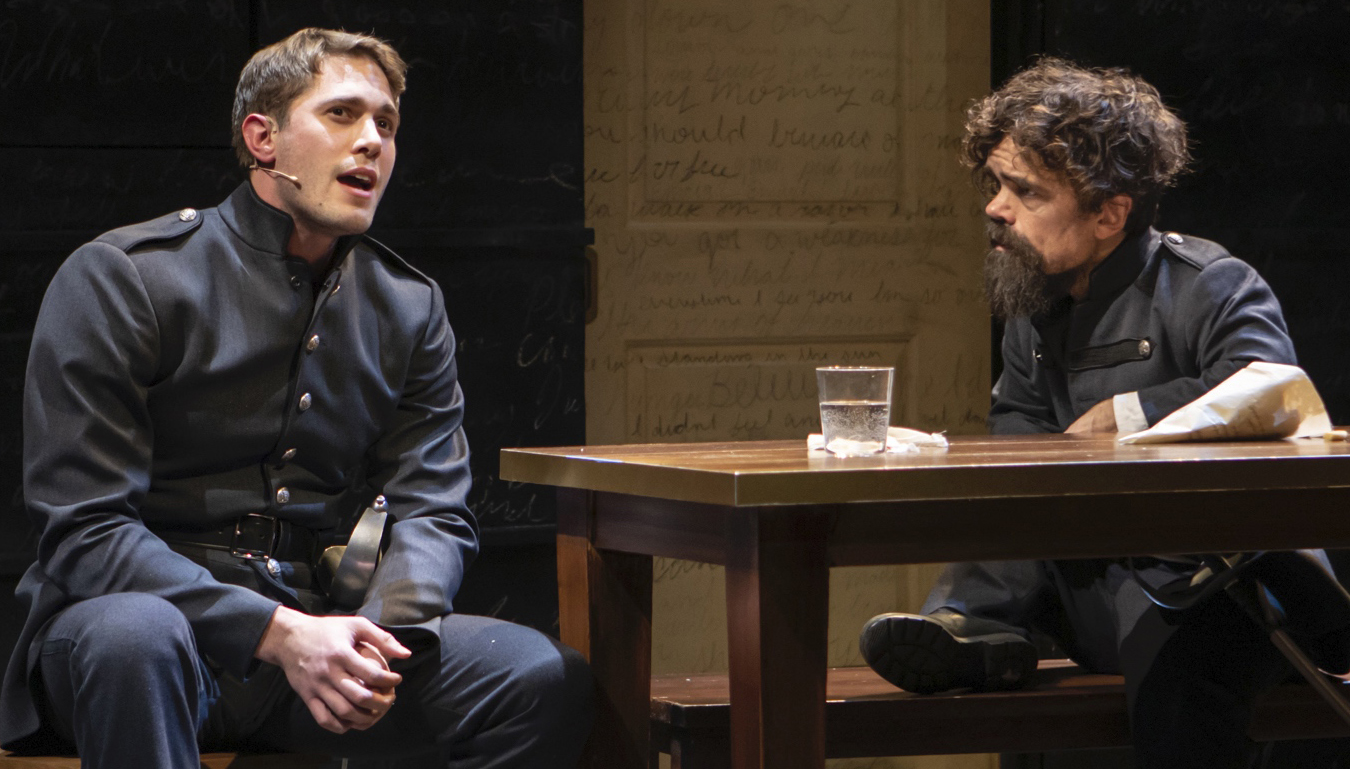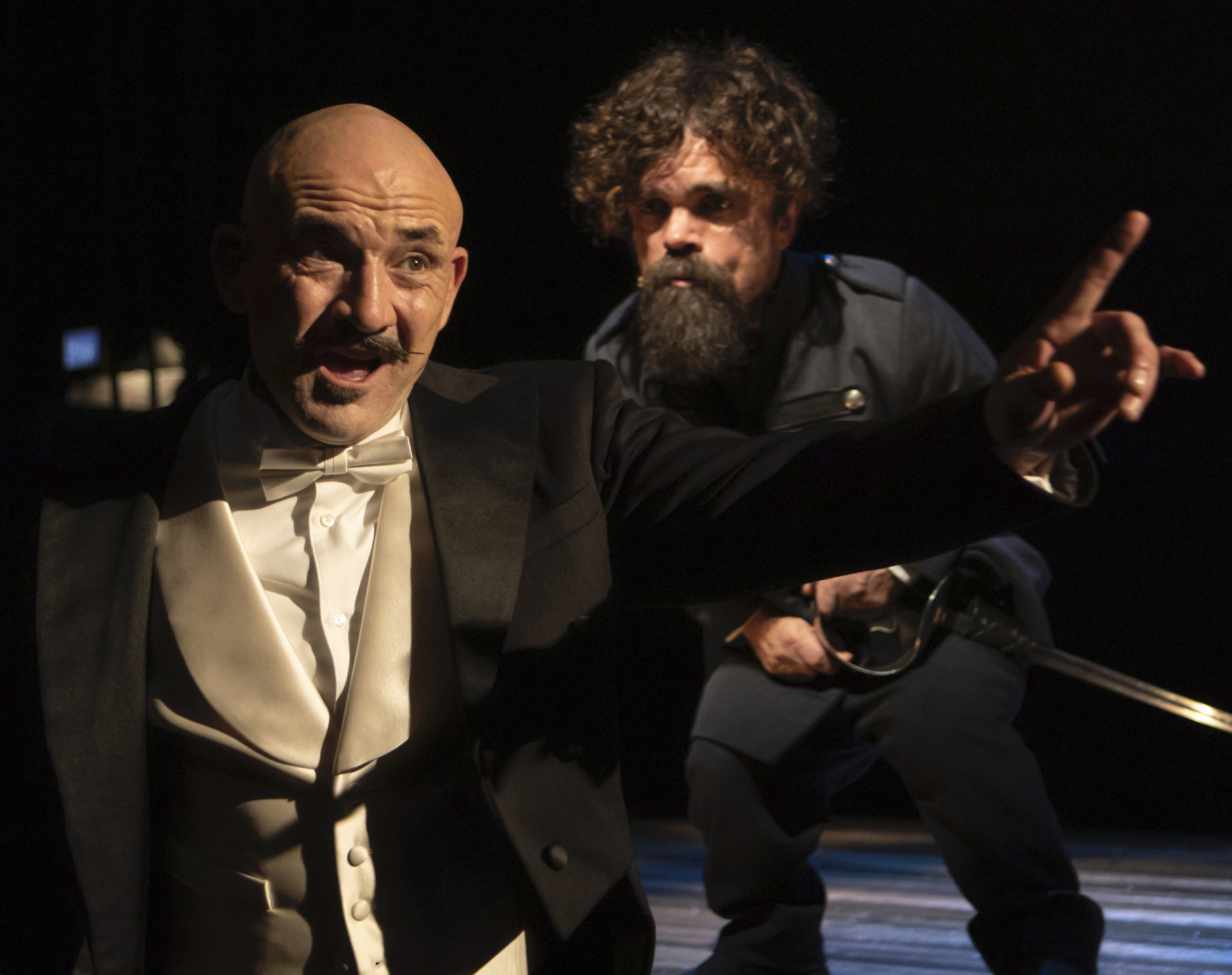In The New Group’s staging of Cyrano, a new musical, the title character (Peter Dinklage, right) becomes acquainted with Christian (Blake Jenner), the younger cadet he has promised to protect.
The New Group playbill says Cyrano is “adapted by Erica Schmidt from Cyrano de Bergerac by Edmond Rostand.” Schmidt is a distinguished mid-career stage director and author of All the Fine Boys, a gritty, unsettling 2017 drama which, like Cyrano, was given its New York City premiere by The New Group. As “adaptor,” Schmidt has dismantled Rostand’s 1897 masterpiece, reassembling a few of its elements as a streamlined libretto with a prevailing tone of melancholy.
Christian and Roxanne (Jasmine Cephas Jones) in the balcony scene, with Cyrano below, in a radically reimagined musical adaptation of Cyrano de Bergerac.
The show’s intense, somewhat repetitive score is by four artists associated with the indie rock band The National: twins Aaron and Bryce Dessner (composers) and spouses Matt Berninger and Carin Besser (lyricists). The upshot is a Gen-X musical-theater piece stripped of the neo-romantic grandeur, classically inspired verse, and exuberant comedy of Rostand’s heroic melodrama. What remains is a compact vehicle for Peter Dinklage (Tyrion Lannister in the HBO series Game of Thrones), whose resonant baritone (better suited to dialogue than song) is shown off to advantage (though it would be more impressive if paired with a good translation of Rostand’s inspired alexandrines).
One of the best-loved characters in western literature, Cyrano was inspired by Savinien Cyrano de Bergerac (1619–55), a pioneer science-fiction writer. Rostand’s imagination transformed this obscure figure into a valiant Gascon soldier and poet, bombastically proud, who taunts his antagonists with swordsmanship and verse (often simultaneously). In A.S. Kline’s fine translation, Cyrano bellows at a ham actor whose mugging offends him: “I’ll clap my hands three times at you, full moon! / At the third clap, eclipse yourself!”
The new musical retains only the barest bones of Rostand’s saga. Cyrano is in love with Roxanne (Jasmine Cephas Jones) but is convinced that no woman can regard him romantically because of his homeliness and, especially, his grotesquely prominent nose. Fond of Cyrano but oblivious to his passion for her, Roxanne begs him to watch over Christian de Neuvillette (Blake Jenner), a cadet, soon to join Cyrano’s regiment, whom she loves from afar and fears will be hazed by older soldiers.
Once acquainted with Christian, Cyrano recognizes that the cadet is as smitten with Roxanne as she is with him; but he’s surprised to find the handsome young man air-headed and tongue-tied (hardly a worthy mate for Roxanne). Becoming fond of Christian and resigned that Roxanne can never overlook his nose, Cyrano resolves to ghostwrite poetic letters to woo the literary-minded Roxanne for the younger man. “I am a poet,” he tells Christian. “I will make you eloquent and you, you will make me handsome.”
Schmidt dispenses with almost all that’s joyful and much of what’s funny in Rostand’s play. Among the casualties: those voluble soliloquies in verse and the rollicking adventure of Roxanne’s visit to the active battlefield at Arras. Melodrama—deliciously over-the-top in the original—is downplayed, with the sinister Comte De Guiche (Ritchie Coster) less black-hearted thanks to a pensive aria, “What I Deserve,” that hints at a lifetime of psychic pain.
The most prominent feature of Rostand’s protagonist, that famously outsized nose, is supposedly true to history. Actors playing Cyrano—from Benoit-Constant Coqueline to Gerard Depardieu, Steve Martin, and Kevin Kline—have sported elaborate prosthetics. Dinklage forgoes the fake proboscis. Small in stature but notably virile and not homely, Dinklage “acts” Cyrano’s ugliness (or at least its effects) in a complex characterization mixing despondency, extreme insecurity and compensating braggadocio. This is effective, though it’s not easy to explain why. Suffice it to say that great actors have powers akin to magic, and Dinklage has been acknowledged as a great actor since his breakout screen appearance in The Station Agent in 2003.
Strong personalities collide as Cyrano encounters the sinister Comte De Guiche (Ritchie Coster, left). Photographs by Monique Carboni.
Dinklage and Schmidt, who are a married couple, collaborate frequently. In New York City, they did a noteworthy production of Turgenev’s A Month in the Country four years ago. For Cyrano, they’re joined by 10 very good actors (Coster and Jenner are especially fine), and a distinguished design team—Christine Jones and Amy Rubin for sets; Tom Broecker, costumes; Jeff Croiter, lighting; and Dan Moses Schreier, sound—that gives the production a look and sound as bleak and downbeat as the script and score.
With Schmidt’s streamlined text and songs from members of The National (a band known for themes of unconsummated and unsatisfactory love), this musical captures Cyrano’s pride but not the “panache” that Rostand makes so much of. What this adaptation gets right is the end of the play, with its autumnal tone and heartbreaking obligatory scene between Cyrano and Roxanne. That final scene makes a visit to this production worthwhile—that and the presence of Dinklage, who’s giving a performance (like John Slattery’s in Three Days of Rain or Cherry Jones’s in The Glass Menagerie) that discerning theatergoers will replay in their minds’ eyes from here on out.
Cyrano runs through Dec. 22 at The Daryl Roth Theatre (101 East 15th St.). Performances are at 8 p.m. Tuesdays to Saturdays; 7:30 p.m. Sundays; matinees at 2 p.m. Saturdays and Sundays. Open-caption performance, Saturday, Nov. 9 at 2 p.m.; ASL performance, Friday, Nov 15 at 2 p.m.; audio-described performance Nov. 16 at 2 p.m. For information and tickets, call (917) 935-4242 or visit thenewgroup.org.





